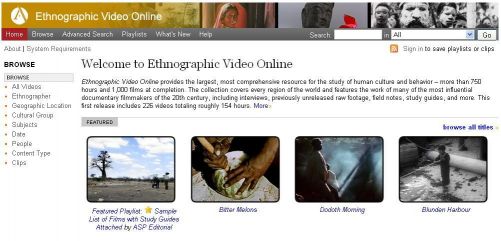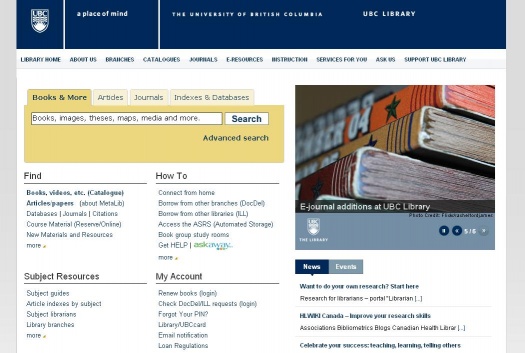March 15th, 2010 by Susan Atkey | No Comments »
Save valuable research time! Online research resources offer an array of tools to help you stay current in your field. In this workshop you’ll learn how to set up email alerts and RSS feeds to:
- be notified when new articles and dissertations are published on your topic
- receive Table of Contents for the latest issue of your favorite journal
- find out when new books in your discipline have arrived in the library
- be notified of funding and upcoming conference opportunities
- follow news stories and blogs
No matter what your discipline, you’ll leave the session having set up a number of alerts to stay up-to-date with your research interests!
Date and Time: Wednesday, March 17th from 11:00am – 12:30pm
Location: Koerner Library, room 217 (map)
Register here: http://elred.library.ubc.ca/libs/dashboard/view/679
Posted in Workshops and Tutorials | No Comments »
March 11th, 2010 by Susan Atkey | 1 Comment »
We now have trial access to a new database : Ethnographic Video Online

From the publisher’s description:
The collection covers every region of the world and features the work of many of the most influential documentary filmmakers of the 20th century, including interviews, previously unreleased raw footage, field notes, study guides, and more. Still in development, the collection will also include a wide range of indigenous media, from early experiments, to works from modern-day indigenous film production companies.
This first release of Ethnographic Video Online includes over 200 titles totaling roughly 150 hours, indexed at the title-level. The second release, scheduled for Summer 2010, will more than double the size of the database. The rich and unique content is enhanced by a suite of tools with Semantic Indexing and searchable transcripts synchronized to video, offering the ability to drill down and find the footage of interest from hundreds of hours of video.
Video can be shared via embeddable links; user-created playlists and clips, with annotation features and the ability to incorporate other content from outside the collection; and more. These features and capabilities render video as useful for research and classroom use as any scholarly text.
The trial is available from now to April 11, 2010.
Please be sure to provide feedback via the form on the info page or directly to me.
Posted in Film, What's New? | 1 Comment »
February 24th, 2010 by Susan Atkey | No Comments »

Ever wondered how the peer-review process works?
The latest issue (March 2010) of the journal American Anthropologist offers an editorial on the process at the American Anthropologist, along with three suggestions to successful reviewing. As someone who often talks to students about the differences between peer-reviewed versus popular articles, I found this behind-the-scenes look quite interesting.
I won’t give away all the tips here since you can go over and read the article online via our subscription through Anthrosource, but one suggestion that caught my eye was “Just Write the Damn Review” because:
tardy reviewers are the number one source for delayed responses to authors and, thus, the primary contributor to the sometimes-slow pace of journal publishing about which many scholars complain.
For another take on the peer-review process (and one that inspired the editorial at the American Anthropologist), see the article The Peer-Review System Is Broken in the Chronicle of Higher Education (another journal to which UBC Library subscribes online).
Citations
Boellstorff, Tom.
2010 Three Tips for Making Peer Review Work for You. American Anthropologist 112(1): 1-4.
Myers, Daniel J.
2009 The Peer-Review System Is Broken. Review. Chronicle
of Higher Education, August 31.
Posted in Uncategorized | No Comments »
February 23rd, 2010 by Susan Atkey | No Comments »
In 2008, the Australian government announced plans for a new research quality and evaluation system called the Excellence in Research for Australia (ERA) initiative. One of the indicators used is discipline-specific journal rankings, and they’ve just released the 2010 Ranked Journal List which assigns a rating of A*, A, B, or C to 20,712 unique peer reviewed journals.
Not surprisingly, the key publications of the American Anthropological Association fared well: American Anthropology, and American Ethnologist received the highest grades of A* while Medical Anthropology Quarterly, Current Anthropology, Journal of Linguistic Anthropology, Visual Anthropology, and Ethos all received respectable grades of A. UBC Library subscribes to all of these journals via Anthrosource.
Thanks to Greg Downey at the Culture Matters blog for compiling and coding all the anthropology journals into a single manageable spreadsheet, which you can access in pdf form here.
Posted in Journals | No Comments »
January 27th, 2010 by Susan Atkey | 1 Comment »
In celebration of their 40th Anniversary, BC Studies has created audio recordings of forty of the most influential articles published in the journal to-date.

Articles of anthropological interest include:
- Invention of Anthropology in British Columbia’s Supreme Court: Oral Tradition as Evidence in Delgamuukw v. B.C. by Julie Cruikshank
BC Studies #95, Anthropology and History in the Courts (Autumn 1992), pgs: 25-42. (download mp3)
- The Pivotal Role of the Northwest Coast in the History of Americanist Anthropology by Regna Darnell
BC Studies #125/126, Ethnographic Eyes (Spring/Summer 2000), pgs: 33-52. (download mp3)
- “That’s My Dinner on Display” : A First Nations Reflection on Museum Culture by Gloria Jean Frank
BC Studies #125/126, Ethnographic Eyes (Spring/Summer 2000), pgs: 163-78. (download mp3)
There are many more – see the full list of 40 here. If you’d prefer to read the articles, check out our print and online options to read the journal BC Studies here.
Posted in Electronic Resources, What's New? | 1 Comment »
January 27th, 2010 by Susan Atkey | No Comments »
The journal Anthropology News invites submissions on the topic of censuses and anthropology for its May 2010 issue:
A census is a powerful mechanism that both reflects and constructs social taxonomies in profound ways, impacting nations’ perceptions of themselves, the distribution of government funds, the provision of public services, and even legislation. In this US Census year we ask our readers to critically consider this tool: how it is (re)constructed over time, its uses and limitations, its intended and unintended effects.
How have past and present censuses measured race and ethnicity, linguistic diversity, family relationships and residency? How are identities and relationships differentially constructed, recognized, legitimized or made invisible through these metrics? What population measures inform policy and public discourse in areas such as immigration and education?
The deadline for submissions is January 29 and you can read more details on the submission process here.
We have a number of books on the topic at UBC Library. Here’s a couple of relatively recent ones to whet your appetite:
- Categories and contexts : anthropological and historical studies in critical demography / edited by Simon Szreter, Hania Sholkamy, A. Dharmalingam. (Available online or in print.)
- Census and identity : the politics of race, ethnicity, and language in national census / edited by David I. Kertzer and Dominique Arel. (Available online or in print.)
Finally, CSA (one of our major database providers) offers a new guide (Jan. 2010) to the topic of race, ethnicity, and the U.S. census in their series of Discovery Guides. This one, called Multiracial Identity and the U.S. Census, offers a a broad overview of the topic, a history of multiracial identity in the US censuses going back to 1790, and links to key citations indexed in CSA’s Sociological Abstracts database (to which UBC Library subscribes).
Posted in Cultural Anthropology | No Comments »
January 25th, 2010 by Susan Atkey | No Comments »
Interested in anthropology and want to know more about possible career paths? The American Anthropologist Association hosts a series of podcasts exploring the roles of anthropologists outside of traditional academic settings. Each podcast is in the form of an interview with someone working in anthropology outside of academia.
In the current podcast, #4 in the series, Kevin Bialy of the Fogarty International Center at the National Institutes of Health (NIH) discuses his role as acting international program officer for the Western Hemisphere and offers suggestions for students interested in governmental work.
Previous Profiles in Practice podcasts include:
Posted in Uncategorized | No Comments »
January 4th, 2010 by Susan Atkey | No Comments »

Happy New Year to you all!
If you visit the UBC Library homepage, you’ll notice there has been a change in appearance corresponding to the new UBC common look and feel.
The familiar pathways you use to access library information and services are still there. For example, the frequently used links under “Find”, “How To”, “Subject Resources” and “My Account” are the same – they’ve just shifted to the left hand side of the page.
What’s new? Main changes include:
1. A new “one search” box linking to a new search tool that allows you to search for a term and get results from many of our different electronic resources within one search interface. For more information on this tool, go here.
2. A rotating “carousel” highlighting key library news and events
3. Events and news automatically updated on the main page so that you can quickly see upcoming workshops such as RefWorks, Current Awareness Tools, and more
Posted in What's New? | No Comments »
December 8th, 2009 by Susan Atkey | No Comments »
The most recent issue of the journal Anthropology Today contains an interview with UBC’s Anthony Shelton, Director of the Museum of Anthropology and Professor of Anthropology:
Negotiating new visions: An interview with Anthony Shelton by Gustaaf Houtman
“In his interview, Anthony Shelton reflects on his past 25 years working in museums and universities and the changing relationship between anthropology and ethnographic exhibitions and museum practices. Shelton talks about the field of critical museology which he has theorized and set out over many years and which stands as a substantial critique of conventional museum practice, and answers questions about the emergence and potential of new radical approaches to the exhibition of indigenous cultures as exemplified by the UBC Museum of Anthropology’s multi-million dollar project, ‘A Partnership of Peoples’ which is due to open in January of 2010.”
UBC Library subscribes to the journal Anthropology Today. You can read the fulltext online at: http://www3.interscience.wiley.com/journal/123192876/abstract
Posted in ANTH Department | No Comments »
March 10th, 2009 by Susan Atkey | No Comments »
The Department of Anthropology and the Laboratory of Archaeology invite you to Archaeology Day 2009. The theme this year is Archaeology at UBC and Beyond: Welcoming Our Neighbors.
This event takes place this Saturday, March 14th, in room 207 in the ANSO building at UBC.
For more information, see a pdf of the schedule here.
Posted in ANTH Department | No Comments »




